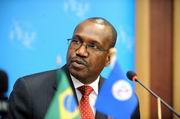Italia

Pubblichiamo di seguito l’intervento del Segretario generale ITU, Hamadoun Touré, all’Avaya Forum 2013, l’appuntamento di riferimento della community italiana dell’ICT promosso da Avaya Italia e dedicato quest’anno al tema dell’Agenda Digitale per l’Italia e alle sfide che attendono il nostro Paese nel prossimo futuro.
Good morning to you all.
- It is a great pleasure to be able to join you in Rome this morning, using the power of technology to attend your forum in Rome from my office here in Geneva.
- In the second decade of the 21st century, we all recognize the vital importance of broadband as a key enabler for competitiveness and for sustainable social and economic development for all countries.
- This is why the Broadband Commission for Digital Development, set up three years ago by ITU and UNESCO, set ambitious but achievable targets for global broadband development.
- The first of these targets aims to help make broadband policy universal by 2015 – and we have already seen considerable success in this regard, with well over 100 countries having established a national broadband plan, included broadband in their Universal Access / Universal Service definitions, or both.
- The importance of broadband to all countries was made very clear at the World Conference on International Telecommunications, WCIT-12, which took place in Dubai last December.
- And I am pleased to note that the new International Telecommunication Regulations – the ITRs – which came out of WCIT contain important new provisions, notably in Article 6, which will encourage investment in international telecommunication networks and which will promote competitive wholesale pricing for traffic carried.
- This is one of the most important articles in the revised ITRs and I am confident that it will play a very important role in furthering broadband rollout around the world – and in bringing the Internet within reach of the 4.5 billion people globally who are still offline.
- We are among the privileged ones – the 2.5 billion who are connected today, and I am sure no one attending this Forum forgets about the remaining two thirds of the world’s population who remain unconnected.
- The revised ITRs also contain several new resolutions, which do not require any ratification, acceptance or approval process, and are not inherently binding for Member States.
- They are nonetheless important texts and will themselves help to promote improved access to ICTs to all the world’s people, and to ensure the long-term sustainability of the Internet.
- In this regard I would like to draw your attention to the third resolution, which addresses the fostering of an enabling environment for the greater growth of the Internet.
- The resolution specifically calls for greater broadband investment and expresses support for the multi-stakeholder model for Internet governance.
Ladies and gentlemen,
- In closing my short intervention this morning, let me reaffirm ITU’s commitment to continue acting as a bridge between Member States and the private sector, and to continue acting as a positive catalyst for ICT development worldwide.
- I have already mentioned our positive role in creating an environment conducive to telecoms infrastructure investment and rollout, but let me also mention two other areas where ITU is working to make a positive difference.
- The first is cybersecurity, which has already clearly become one of the greatest issues of our times, and it will continue to grow in importance.
- This is a global issue, which can only be solved with global solutions – and this is why we must work together to set international policies and standards, and to build an international framework for cybersecurity and cyberpeace.
- At ITU we are proud of the ITU-IMPACT initiative, which is the first truly global multi-stakeholder and public-private alliance against cyberthreats, which already brings together more than 140 countries.
- To be truly effective, however, such initiatives must include participation from all stakeholders, including both the public and private sectors, as well as international organizations.
- They must also be complementary, and avoid creating silos, which risk fragmenting a coherent, coordinated approach to ensuring global cyber-resilience – our common goal.
- And the second is emergency telecommunications, which play an absolutely critical role in saving lives and mobilizing resources in the wake of disasters.
- Advanced ICTs like wireless and satellite communication systems, remote sensing systems and satellite imaging can make a real difference during those first crucial hours and days – scoping out the extent of damage, helping locate survivors, measuring danger for rescue teams, and ensuring humanitarian response crews can communicate effectively with their team members, with other agencies working onsite, with local hospitals and paramedics, and with the victims.
- ITU has long been a champion of emergency telecommunications.
- Through each of our main sectors – radiocommunications, standardization and development – we invest considerable resources, time and energy into the continued development and deployment of these vital services and infrastructure, wherever and whenever they are needed.
Thank you.












